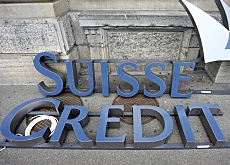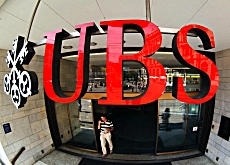Credit Suisse shuts door to clients from Iran

Credit Suisse, Switzerland's second largest bank, says it will not be entering into any new business with clients in Iran and Syria.
The announcement comes just a day after its rival, UBS, announced it was severing ties with all clients in Iran.
Credit Suisse said on Monday that it would not be taking on any more new business in the countries concerned, but current ties to clients would continue.
The same rules apply to Cuba, Sudan, Myanmar and North Korea.
The step was taken because of the geopolitical situation and as a result of internal risk assessment, a spokesman said.
On Sunday Credit Suisse said it was watching the situation in Iran closely but argued it could not terminate relationships at short notice.
Tehran faces referral to the United Nations Security Council for possible sanctions after failing to convince the world that its nuclear programme is peaceful.
Iran, Syria and North Korea have been tagged as rogue nations by the United States – a major market for Switzerland’s two biggest banks.
Severing ties
On Sunday, UBS – the world’s sixth largest bank – said existing ties with all its Iranian clients would be cut because the business was unattractive.
The announcements are seen as a radical departure from the previous public relations strategy of Switzerland’s leading commercial banks.
In the past they refused to disclose any information on business relations with clients from Syria.
Iranian clients hold SFr1.4 billion ($1.1 billion) in assets in Swiss banks, according to data from the Swiss National Bank, while Syrian deposits account for SFr8.6 billion.
Switzerland is the world’s largest centre for off-shore wealth and is considered a safe haven for clients from countries where political or regulatory instability bars them from putting their money into a local bank.
The US has imposed financial sanctions on Syria, but there are no international regulations banning financial dealings.
However, under due diligence rules Swiss banks have to check the identity of their clients.
swissinfo with agencies
Iran is facing the threat of sanctions by the UN Security Council over its disputed nuclear programme.
The UN has blamed Syria for the killing of a senior Lebanese politician, Rafik Hariri, last year.
Both countries, as well as North Korea, have been listed as rogue nations by the United States – a major financial market for the Swiss banks.
Iranian assets in Swiss banks account for SFr1.4 billion ($1.1 billion), while Syrian deposits are worth SFr8.6 billion, according to data from the Swiss National Bank.
Most of the funds are deposited with the two largest commercial Swiss banks, UBS and Credit Suisse.

In compliance with the JTI standards
More: SWI swissinfo.ch certified by the Journalism Trust Initiative

You can find an overview of ongoing debates with our journalists here. Please join us!
If you want to start a conversation about a topic raised in this article or want to report factual errors, email us at english@swissinfo.ch.